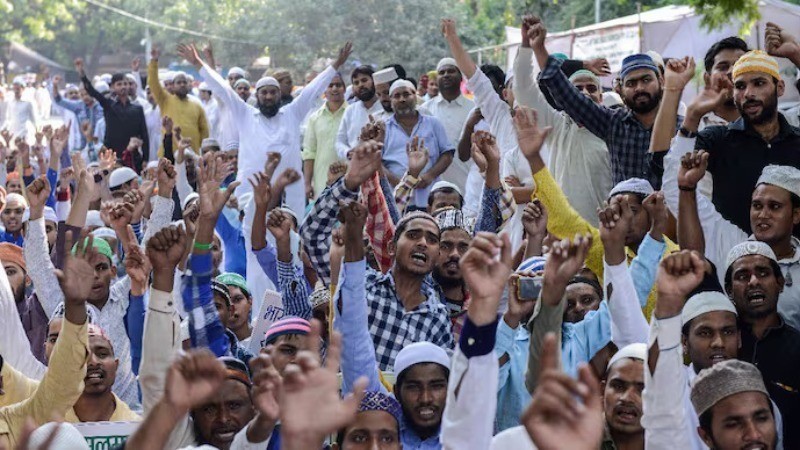
NEW DELHI: The Supreme Court's decision on the demand for providing government facilities to Rohingya intruders living illegally in India has drawn nationwide attention. the Supreme Court now directed that if government schools in Delhi refuse to admit Rohingya children, they can appeal to the Delhi High Court. This decision was given during the hearing of a Public Interest Litigation (PIL) demanding facilities like education, medical and ration for Rohingyas.
On Monday (17 February 2025), a bench of Justice Suryakant and Justice Kotishwar Singh of the Supreme Court heard the case. The court said that the children of Rohingya infiltrators should apply for admission to the government schools for which they are eligible. If for any reason they do not get admission, they can file a petition in the Delhi High Court. This decision was given on the petition of an organization called Social Jurist A Civil Rights Group, which claimed that government schools in Delhi are not giving admission to these Rohingya children due to lack of Aadhar card.
Earlier, while hearing this case, the Delhi High Court had said that Rohingyas are not refugees and neither has the government given them this status. The High Court had rejected this petition and asked the petitioners to take their demand to the Home Ministry. But when this matter reached the Supreme Court, the court took a different stand and allowed these illegal immigrants to appeal to the High Court to get education.
Apart from admission in government schools of Delhi, the demand for free medical treatment and ration for Rohingya infiltrators is also being raised in the Supreme Court. Recently, an NGO named 'Rohingya Human Rights Initiative' filed a petition in the Supreme Court demanding directions to the Central and Delhi governments to provide free treatment in government hospitals and the benefit of public ration schemes to Rohingya Muslims. The most important thing here is that these facilities are not available for free even to the citizens of India. A common Indian citizen also needs ration card, Aadhaar card and other government documents, but no such obligation is being kept for Rohingya infiltrators.
The petition filed in the Supreme Court also demanded that these Rohingya children be allowed to appear for class 10, 12 and graduation examinations even without Aadhaar card or any other identity card. The biggest question that arises here is that when Hindu, Sikh, Jain, Buddhist and Christian refugees from Pakistan, Afghanistan and Bangladesh are not given any special facilities in India, then why are Rohingya infiltrators getting this privilege?
Minorities from Pakistan, Bangladesh and Afghanistan have been living without citizenship for years. These people came to India to seek refuge under the Nehru-Liaqat Pact, they were not intruders. Still, they are not given the benefit of any government facility. They are struggling to get citizenship, while on the other hand the demand for providing free education, ration and health facilities to Rohingya Muslims settled illegally in India is gaining momentum. Rohingya Muslims who came illegally from Myanmar are currently settled in large numbers in states like Delhi, Jammu, Haryana, Uttar Pradesh and Bengal. They have a large population in Muslim-dominated areas like Shaheen Bagh, Kalindi Kunj and Khajuri Khas in Delhi. The central government has many times described these intruders as a security threat to the country, but despite this, petitions are being filed in their support.
When America, Europe and even Muslim countries are not ready to keep Rohingyas, then why should India accept them? Bangladesh called them a threat to security, Islamic countries like Indonesia and Malaysia are also not accepting them, and Arab countries have also banned their entry. But in India, petitions are being continuously filed in their support and now the Supreme Court is also giving a decision in their favor.
Lawyers and NGOs fighting legal battles for the Rohingyas are also under suspicion. In this case, a lawyer named Colin Gonsalves has urged on behalf of the Rohingyas in the Supreme Court. His NGO 'Human Rights Law Network' (HRLN) has previously been associated with funding from American billionaire George Soros. Soros is the same person who has openly declared a change of power in India. His aim is said to be to weaken the Indian government and its security policy. An NGO named 'Rohingya Human Rights Initiative' (R4R) also receives money from the Netherlands-based 'Global Statelessness Fund', which is financially supported by Soros' 'Open Society Foundation'. This organization was also active in the anti-CAA movements.
Now a moot question is whether the tax money of the people of India should be spent on illegal immigrants? If the Supreme Court orders the government to provide free education to Rohingya children, then the common citizens will have to bear the burden. Will this decision not be unjust to the citizens of India? The Indian government should re-implement the NRC (National Register of Citizens) and make a concrete policy to expel these immigrants from the country. If other countries of the world do not tolerate illegal immigrants, then why should India do so?